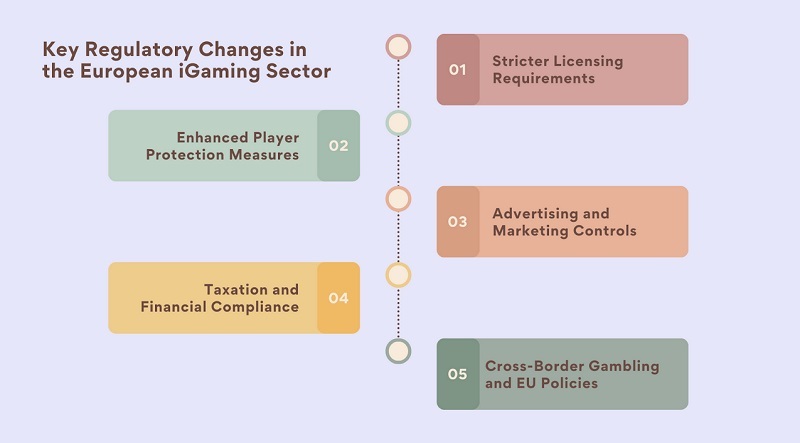
The European iGaming market continues to evolve with new regulations that shape licensing, advertising, player protection, and taxation. These changes aim to offer consumers a safer betting environment while ensuring operators meet higher standards of transparency and responsibility. In Spain, where the industry is strictly overseen by the Dirección General de Ordenación del Juego (DGOJ), sports bettors benefit from enhanced security measures and fair play conditions. For example, users interested in a secure and compliant platform can consider registration 1xbet as one of their options.
Overview of European iGaming Regulations
Europe’s iGaming sector is characterized by diverse regulatory frameworks. While the United Kingdom and Malta have long-established authorities with clear guidelines, several countries are now tightening their rules to better protect consumers. Spain exemplifies this trend with rigorous licensing requirements, strict advertising rules, and robust player protection measures enforced by the DGOJ. These modifications aim to minimize risks such as gambling addiction, fraud, and financial irregularities, while promoting transparency across the European market.
Regulatory changes are driven by consumer demand for safer betting practices and a need to establish a level playing field within the European Union despite varied national regulations.
Key Regulatory Changes Affecting the iGaming Sector

Recent legislative updates cover several critical areas:
Stricter Licensing Requirements
European nations are enforcing higher standards in licensing procedures. Operators must now provide comprehensive documentation that demonstrates financial stability and a commitment to responsible gaming. In Spain, every online betting platform must secure a national license from the DGOJ, reducing the risk of unregulated operators.
Enhanced Player Protection Measures
Consumer safety remains a top priority. Authorities have introduced measures such as:
-
Deposit and betting limits: To prevent excessive spending.
-
Self-exclusion programs: Allowing players to bar themselves from betting sites.
-
Stricter age verification: To protect minors from accessing gambling services.
These measures, along with comprehensive advertising restrictions and bonus limitations, create a safer environment for sports bettors.
Advertising and Marketing Controls
New regulations impose tight controls on advertising practices. In Spain, for instance, gambling ads are restricted to early morning hours, reducing exposure to aggressive marketing. Similar restrictions in other European countries ensure that promotional content remains balanced and informative.
Taxation and Financial Compliance
Governments are revising tax policies to ensure that iGaming revenues contribute adequately to public funds. In Spain, operators are subject to a 20% tax on gross gaming revenue (GGR) and must comply with strict anti-money laundering (AML) regulations, promoting transparency and accountability.
Cross-Border Gambling and EU Policies
Despite the EU’s efforts to create a unified digital market, regulatory practices remain fragmented. Some countries restrict access to offshore betting platforms, while others offer licenses that enable operators to serve multiple jurisdictions. Spanish authorities monitor cross-border activities closely to ensure that foreign operators adhere to local laws, thus protecting local consumers.
Impact on Spanish Sports Bettors
These regulatory reforms translate into tangible benefits for sports bettors in Spain. Enhanced licensing standards and robust consumer protection measures foster an environment defined by safety, fairness, and transparency. Bettors gain access to thoroughly vetted and regulated platforms, reducing the risk of fraud and unethical practices. For instance, platforms such as Registrarse en 1xBet demonstrate compliance with strict national standards, offering users greater security and peace of mind.
Key benefits include:
-
Greater security: Stringent regulations help minimize fraud and malpractice.
-
Responsible gaming tools: Features such as deposit limits and self-exclusion programs promote safer betting habits.
-
Assured compliance: Licensed operators adhere to strict national standards, ensuring fair play.
Future Perspectives and FAQs
With regulatory frameworks under continuous review, the iGaming landscape is expected to evolve further. Authorities aim to refine licensing processes, enhance player protection, and enforce stricter advertising rules. Stakeholders anticipate that these changes will lead to a more secure and transparent market.
FAQ
-
What do stricter licensing requirements mean for operators?
Operators must meet higher transparency and financial stability standards, ensuring only reputable companies serve the market. -
How do enhanced player protection measures affect betting practices?
These measures, such as betting limits and self-exclusion programs, help manage gambling habits and reduce the risk of addiction. -
Why are advertising restrictions important?
They balance promotional efforts with consumer protection, reducing exposure to aggressive marketing. -
What is the impact of increased taxation on operators?
Higher taxes ensure that the sector contributes fairly to public finances while promoting regulatory compliance.
As the European iGaming sector adapts to these regulatory changes, sports bettors in Spain can expect an environment that prioritizes safety, fairness, and transparency—core values that underpin a reliable and secure betting experience.













